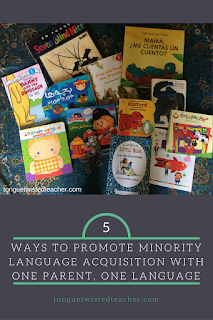When we found out we were expecting our son, my husband and I had all of the conversations first time parents have - sleeping arrangements, how to handle crying, feeding, which gear to purchase. However, unlike many parents, we needed to have a conversation which is unique to our family. How will we balance languages?
I grew up in the United States speaking only English. My husband grew up in Iran speaking mainly Persian, with both Turkish and a regional dialect spoken at home. Both of us starting gaining fluency in other languages in our teens. As adults, we live in Guatemala and speak Persian, English, and Spanish at home. We both view language as a gift which opens doors to cultures, people, and opportunities. It went without saying that we would pass our languages to our son, but we needed to decide how.
After doing our research, we decided to adopt the popular and successful “one parent, one language” approach. From birth, I spoke only in English while my husband spoke only in Persian to our son. Our nanny - and well, the majority of the people we are in contact with- spoke to him in Spanish.
We expected, as it is the norm, that our child would hit language milestones later since he was being exposed to three languages simultaneously. To our surprise and elation, he hit the milestones (sometimes even early) in all three languages.
In the beginning, around two and a half years old, he would not accept code-switching from us. One day, as I dropped him at his Spanish preschool, I reminded him that I had left his ‘cascarones’ in his backpack for his Cinco de Mayo celebration. There is no direct translation for cascarones. So rather than say ‘painted, confetti-filled eggshells’, I used the more-precise Spanish word. Our little linguist responded, “No Mama, you say eggs.”
As our son nears his fourth birthday, our biggest challenge is assuring that he develops literacy and fluency in all three of his languages equally. Living in Guatemala, where Spanish and English are widely spoken and resources are readily available, providing opportunities in Persian have become our focus.
We have developed these ways to support the minority language.
- Speak to pets in the minority language. Our yellow lab, Asal, is the only family member who is monolingual. She only speaks Persian. We adopted Asal several years before our son was born. Originally, part of our decision to train her in Persian was to help me build fluency. It worked - she is the least judgmental listener I know! This definitely took commitment as we also needed to teach our dog-trainer and nanny to speak enough Persian to be consistent with commands.
- Read in the minority language. Speaking another language with your child is great; but nothing helps to build broad, sophisticated vocabulary like reading. We have been lucky enough to travel to Iran several times since our son was born. Each time, filling a suitcase with books, puzzles, movies, and flashcards in Persian.
- Skyping with family frequently. We try to keep relationships thriving across oceans by being in contact with family often. We encourage story time over Skype too. Our son loves to hear his grandparents reading to him, and it gives them conversation fodder too.
- Make the minority language the household, dinner-table language. I have to admit, this has been a tough one for us. (Ok, tough for me.) We decided this would be a great way to increase exposure to Persian. However, my husband and I started our relationship in English, so it is maybe psychologically tricky to change. Right now, my husband is speaking to me in Persian and I respond in English which slightly increases the amount of Persian our son hears daily.
- Value all languages. It is important that our son sees that all three of his languages are viewed as valuable by us. We want him to see both of us using all three.
If you have other methods which work for you, please share them in the comment section.










No comments